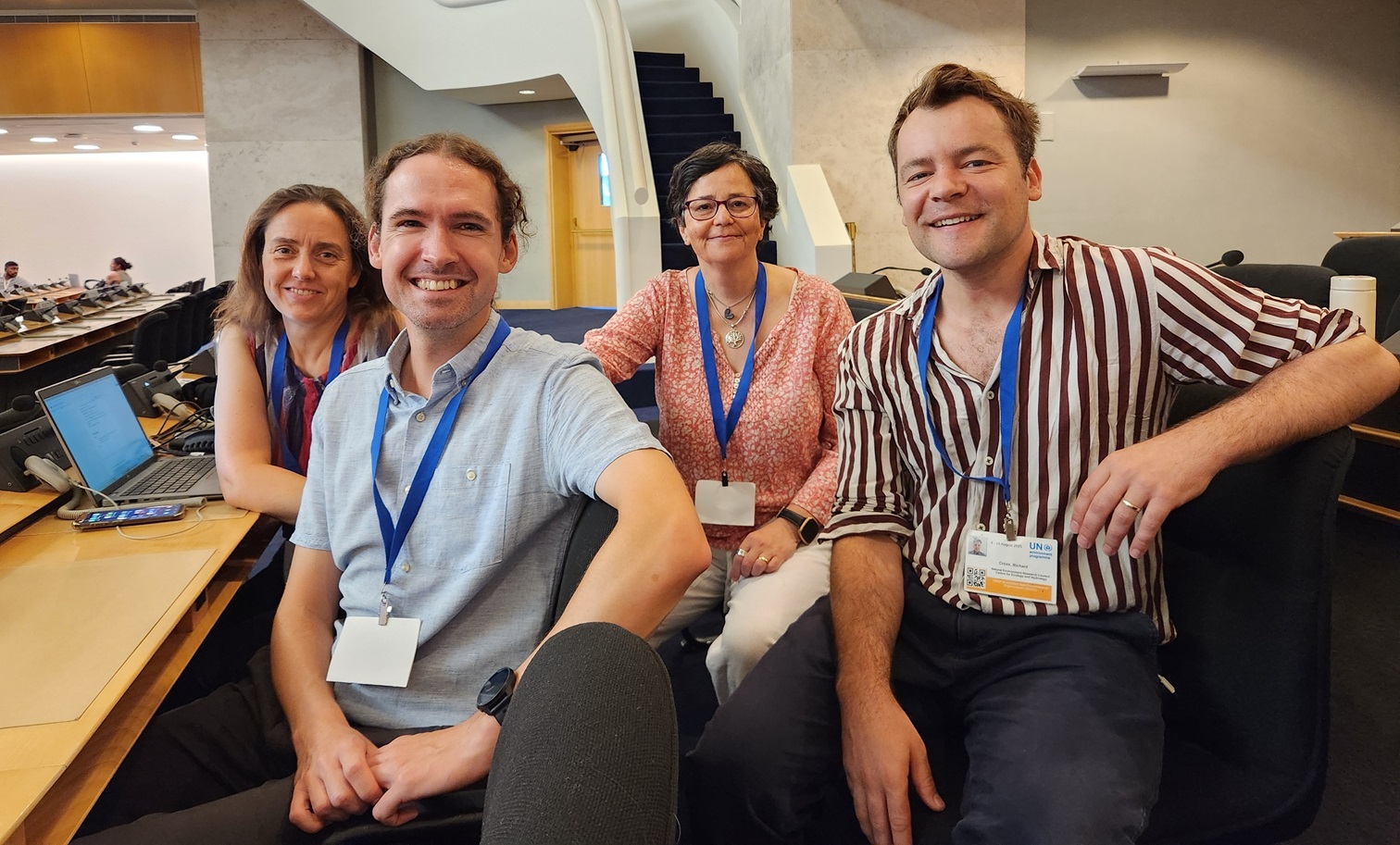A delegation of four scientists from the UK Centre for Ecology & Hydrology were among the observers at the latest international negotiations over the development of a legally binding global treaty to end plastic pollution. Sam Harrison, Richard Cross, Heidrun Feuchtmayr and M. Glória Pereira share their reflections on an intense but educational two weeks at the talks organised by the UN Environment Programme (UNEP) in Geneva...
UNEP Executive Director Inger Anderson warned us right from the off that “multilateralism is messy”, and she was right. After two weeks of late nights, early mornings, shifting goalposts and unpredictable catering services, the sixth and supposedly final negotiating session to develop a global plastics treaty ended “without consensus”.
In non-UN speak, that means ending with no agreement and no treaty.
This was our first experience of multilateral negotiations for the four of us and it was an eye opener into a world of assumed knowledge, seemingly arcane formalities and acronyms.
But within a few days of being on the ground, we had quickly learned what CGs (contact groups), CRPs (conference room papers), infs (formal informals), inf infs (informal informals), co-fax (co-facilitators), interventions, points of order and double handers are.
We also quickly picked up on the important but subtle nuances around language: Countries battled it out whether it should be “a just transition” or “just transitions”, “environmentally sound” or “ecologically sensitive”, whether measures “should”, “shall” or “may” be taken, and the difference between “noting”, “acknowledging” and “welcoming” something.
This session of the Intergovernmental Negotiating Committee (INC) wasn’t meant to exist. The ‘final’ one had been held in Busan in November 2024, but that session had been adjourned without consensus and so UNEP had organised this final, final session – named INC-5.2.
The science is clear
If we didn’t already know the sticking points in negotiations from various reports after Busan, they became abundantly clear from the start of this session. The science clearly shows that plastic production is the main driver of plastic pollution, and tackling plastic pollution cannot be effective without reducing production.
High ambition countries recognise this and call for caps on production, but a small, vocal minority of countries refuse to accept any link between production and pollution. Similarly, we know that chemicals of concern added to, or contained within, plastics are toxic to animals, plants and humans. Yet, some countries claim that chemicals of concern are out of scope for this agreement and are already regulated under existing multilateral agreement (they are not).
These falsehoods played out in the negotiating rooms. As ‘Observers’, our opportunity to intervene (ie say something) is very limited, and we were therefore resigned to hearing these misrepresentations of the science without being able to correct the record. During INC-5.2, Observers were only given one official time slot to intervene (during the opening plenary), where representations could be made on a first-come first-served basis, and therefore making the science heard is often achieved through corridor conversations and side events.

Strengthening partnerships
Talking of side events, these were perhaps the most enjoyable, insightful and productive parts of the negotiations as observers. We attended film screenings, panel discussions, art installations and a launch event for a new public health dashboard.
New connections were forged and old relationships strengthened. Several events highlighted new findings on the human health impacts of microplastics and chemicals of concern. UKCEH’s research on plastics does not typically cover human health impacts, and hearing about some of the more recent findings demonstrating the potential harms caused by plastics really amplified the need for a strong treaty.
In the end, the negotiations came down to a chaotic final 36 hours, where Luis Vayas Valdivieso, the chair of the committee, drafted two new versions of the treaty, which were ultimately both rejected by member states. The final plenary was due to start at 3pm on Thursday, then got incrementally pushed back until it finally started at 11.30pm, for it to last a whole 32 seconds before the chair adjourned the session “to a time to be announced in the morning”.
There were a series of high-level meetings in the small hours of the morning, and eventually the plenary re-started at just after 6am, with the chair informing us that consensus could not be reached and there would be no treaty from this session.
Desire to take action
The end result is disheartening, but there are glimmers of positivity that came out of the process.
Firstly, no treaty is better than a weak treaty, and high-ambition countries were resolute in not watering down their demands for a strong treaty. The next steps are uncertain, but there is likely to be another negotiating session, and there is also talk of high-ambition countries negotiating a treaty outside of UNEP.
We should not forget that across the world, the warnings from the scientific community have been heard and are widely listened to. That we have come so far shows that plastic pollution and its chemical additives cannot be ignored.
There is a real desire to take action to solve this problem, and as scientists we can build the tools and knowledge needed to do so in the coming years, backed up by clear communication to counter mis- and disinformation.
Our research is crucial
Models will be needed to identify hotspots of pollution. Analytical methods must be developed to track and trace micro and nanoplastics, and the chemicals from plastics, throughout the natural environment.
Furthermore, to protect the most vulnerable wildlife, a better understanding of the impacts and toxicity of this complex mixture of materials must be reached. These are all things that UKCEH is well positioned to help with!
Multilateralism might be messy, but that does not mean it doesn’t bring about real progress.
Further information
The UKCEH delegation costs were funded through the National Capability for Global Challenges programme.
Links to UKCEH plastics work/key research:



